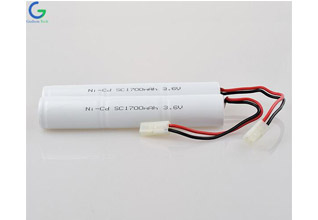About the use and maintenance of Ni-Cd Battery in video equipment
The complete failure of the Ni-Cd Battery is the life of the battery; the self-discharge rate refers to the phenomenon of slowly self-discharging when the battery is fully charged and left unused for a long time. A low self-discharge rate indicates a small decrease in capacity after prolonged placement.
Ni-Cd Battery
For out-of-town shooting programs or news interviews, it is generally used in portable video recording equipment, and the battery used in conjunction with portable video recording equipment can be used as a vital part of efficient and high-quality continuous long-term work to ensure smooth shooting. The normal function of the battery function is closely related to the correct use and careful maintenance of our TV and audio-visual workers in daily work. Therefore, the use and maintenance issues should be taken seriously. As a Ni-Cd Battery Pack Manufacturer, we will share your Ni-Cd battery usage and maintenance issues.
1. In daily work, you should be familiar with the type of battery you use, its basic features and performance. This is of great significance for guiding us in proper use and maintenance, and is also extremely important for extending the life of the battery.
2. When charging, the room temperature is best controlled between 10 ° C and 30 ° C. The right is higher than 30 ° C. It is best to take cooling measures to avoid deformation due to overheating inside the battery; when the room temperature is lower than 5 ° C, it will cause insufficient charging. Affect the battery life.
3. After a period of use of the battery, due to the different degree of discharge and aging more or less, there is insufficient charging and performance degradation. Under normal circumstances, the nickel-cadmium battery can be used once after about 10 times of charge and discharge cycles. Charging. The method is to extend the charging time by about twice as long as the normal charging time. The specific examples are as follows: Charge the NP-1 battery with SONY's BC--1WA (B) charger, fast charge when the green light flashes, green light stops flashing and long light, fast charge ends, and the charging starts, and when the charging time is extended, The drip charging time is the overcharge time, and the overcharge time is preferably 3-4 hours.
4. Battery charge and discharge should be strictly in accordance with the requirements of the standard operation, avoid long-term overcharge, over discharge or frequent charging. Incomplete discharge, long-term low-current deep discharge or short-circuit during battery use are important factors that cause battery capacity to decrease and life to shorten. In the long run, illegal use will not only affect the use, but will also affect the battery capacity and life.
5. In the common BC-1WA (B) charger, the battery charging process should be completed once, not in the middle of the power or after the end of the fast charging, the battery is in a high temperature state, and the power is turned on again, so that the charger is again fast to the battery. Charging will result in overcharging. When the battery alarm indicator flashes during use, the battery should be replaced in time to avoid excessive battery discharge.
6. Nickel-cadmium batteries do not need to be stored for long-term use, but must be discharged to the end voltage (camera battery warning light flashes) before being packaged in the original packaging carton or wrapped in cloth and paper, placed in a dry Store in a ventilated place. Our company also has Dewalt Battery 9.6V on sale, welcome to come to consult.

评论
发表评论